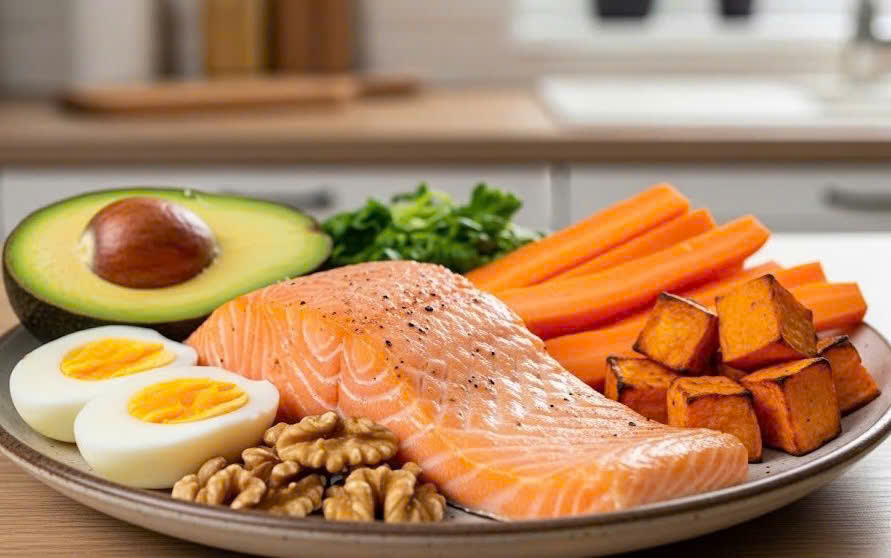Doctor Nguyen Anh Duy Tung, a specialist in dietary nutrition at Tam Anh General Clinic, District 7, explains that a deficiency in B vitamins (such as B1, B2, B3, B5, B6, B7, B9, and B12) can lead to dry, brittle, and easily broken hair, along with increased hair loss and slow regrowth. Biotin (vitamin B7) and vitamin B12 stimulate the synthesis of keratin, the main structural component of hair. Incorporating these nutrients into your daily diet strengthens hair from within and benefits skin and nails.
Eggs provide natural biotin, protein, and vitamin B12. Eating 3-4 boiled or steamed eggs a week helps fortify hair with essential nutrients and prevents anemia, a common cause of hair loss.
Salmon is rich in vitamins B6, B12, and niacin (B3), which, combined with omega-3 fatty acids, have anti-inflammatory properties and stimulate blood circulation to the scalp, promoting hair follicle development. Adults can enjoy salmon twice a week, steamed or baked, to retain its full nutritional value.
Walnuts are packed with vitamin B7 (biotin) and vitamin B6, which increase keratin production and reduce hair breakage. The healthy fats in walnuts also contribute to shinier hair.
 |
Foods rich in B vitamins nourish healthy hair. Photo: Trong Nghia |
Foods rich in B vitamins nourish healthy hair. Photo: Trong Nghia
Spinach is a good source of folate (B9) and iron, which support red blood cell production and increase oxygen delivery to hair follicles. Individuals at risk of hair loss due to anemia should include spinach in their diet 2-3 times a week, lightly stir-fried, boiled, or in green smoothies.
Whole grains like oats, brown rice, and barley contain natural vitamins B1, B2, and B3, supporting energy metabolism and providing consistent nourishment to hair follicles. Regularly consuming whole grains also benefits cardiovascular health and the digestive system.
In addition to supplementing with B vitamins, those with weak, brittle hair should limit their intake of fried foods, carbonated soft drinks, alcohol, sweets, and processed foods. These foods can lead to increased oil production on the scalp, making hair greasy and dull, and hindering the absorption of essential micronutrients for hair health. Protecting hair from sun exposure and high temperatures from hair dryers, curling irons, straighteners, dyes, and styling chemicals is also important.
For healthy hair, Doctor Duy Tung recommends adequate sleep and stress management. Supplements such as cynatine, horsetail, pumpkin seed extract, saw palmetto extract, aged black garlic, and American ginseng can also help protect and nourish hair follicle cells.
Trong Nghia
| Readers can submit their nutrition questions here for the doctor to answer. |












